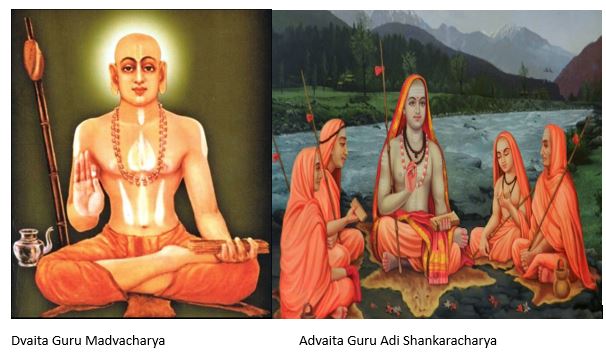Dvaita vs. Advaita
The Indian philosophy has always been known for its unique and diverse perspectives on the nature of reality, the self, and the divine. Two of the most prominent schools of thought in Indian philosophy are Dvaita and Advaita. While Dvaita emphasizes duality and the distinction between the individual self and the divine, Advaita emphasizes non-duality and the unity of the individual self and the divine. In this article, we will explore these two contrasting philosophies and understand the fundamental differences between dualism and non-dualism.
Dvaita and Advaita: Two Visions of the Divine
The two distinct visions of the divine in Indian philosophy. Dvaita, also known as dualism, teaches that the divine and the individual self are separate entities. According to this philosophy, the divine is a personal God who is distinct from the individual self and who controls the universe. The individual self, on the other hand, is a finite and limited entity that is subject to the laws of the universe.
Advaita, also known as non-dualism, teaches that the divine and the individual self are not separate entities but are one and the same. According to Advaita, the individual self is not finite and limited but is infinite and eternal, and is not subject to the laws of the universe. The divine, in Advaita, is not a personal God but is the ultimate reality that is beyond all concepts and categories.
Understanding the Differences Between Dualism and Non-Dualism
The fundamental difference between Dvaita and Advaita is the view of the nature of reality and the self. Dvaita views the universe as a dualistic reality, with the divine and the individual self as separate entities. Advaita, on the other hand, views the universe as a non-dualistic reality, with the divine and the individual self as one and the same.
Another difference between the two is the view of the nature of the individual self. In Dvaita, the individual self is viewed as a finite and limited entity that is subject to the laws of the universe. In Advaita, the individual self is viewed as infinite and eternal and is not subject to the laws of the universe.
The concept of karma is also viewed differently. In Dvaita, karma is viewed as the cause of the individual self’s suffering and bondage, and the only way to break free from karma is to surrender to the personal God. In Advaita, karma is viewed as an illusory concept that arises from the false perception of duality, and the only way to break free from karma is to realize the non-dual nature of reality.
The role of devotion is also viewed differently in Both. In Dvaita, devotion to the personal God is viewed as the means to attain liberation from the cycle of birth and death. In Advaita, devotion is viewed as the means to realize the non-dual nature of reality and to attain self-realization.
The concept of Maya, or illusion, is also viewed differently. In Dvaita, Maya is viewed as the cause of the individual self’s ignorance and bondage, and the only way to overcome Maya is to surrender to the personal God. In Advaita, Maya is viewed as an illusory concept that arises from the false perception of duality, and the only way to overcome Maya is to realize the non-dual nature of reality.
The concept of liberation is also viewed differently. In Dvaita, liberation is viewed as the attainment of a personal relationship with the personal God and the attainment of eternal bliss in the personal abode of God. In Advaita, liberation is viewed as the realization of the non-dual nature of reality and the attainment of the supreme consciousness.
In conclusion, Both are two contrasting philosophies that provide different visions of the divine and the nature of reality. Dvaita emphasizes duality and the distinction between the individual self and the divine, while Advaita emphasizes non-duality and the unity of the individual self and the divine. Understanding the differences between dualism and non-dualism can help us gain a deeper insight into the diverse perspectives of Indian philosophy.

